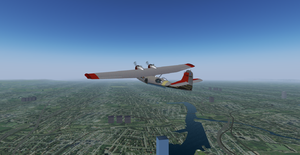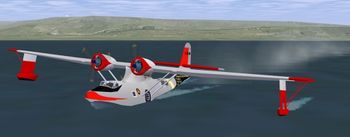Consolidated Aircraft PBY Catalina
 | |
|---|---|
 | |
| Type | Flying boat, Air tanker, Historical aircraft, Military aircraft, Bomber aircraft |
| Configuration | High wing aircraft |
| Propulsion | Twin-engine piston aircraft (Piston aircraft, Twin-engine aircraft), Piston aircraft, Propeller aircraft |
| Manufacturer | Consolidated |
| Author(s) |
|
| FDM | JSBSim |
| --aircraft= | Catalina-OSG |
| Status | Early production |
| FDM |
|
| Systems |
|
| Cockpit |
|
| Model |
|
| Development | |
| Hangar | GRTux hangar |
| Website |
|
| Repository |
|
| Download |
|
| Forum |
|
| License | GPLv2+ |
|
| |
The PBY Catalina was an American flying boat of the 1930s and 1940s produced by Consolidated Aircraft. It could be equipped with depth charges, bombs, torpedoes, and .50 Browning machine guns and was one of the most widely used multi-role aircraft of World War II. PBYs served with every branch of the US military and in the air forces and navies of many other nations. In the United States Army Air Forces and later in the USAF their designation was the OA-10, while Canadian-built PBYs were known as Cansos.
The Catalina in FlightGear is an unarmed air tanker version (for water bombing), with French liveries.
About the aircraft
Aircraft help
| Key | Function |
|---|---|
| Space/S | Starter |
| F | Toggle floats up/down |
| L | Release water over your target (water bombing) |
| ⇧ Shift+L | Ask for water loading when ready |
| ⇧ Shift+B | Parking brake and anchor |
Startup
- Increase magneto switch and electric master switch on.
- Press the starterS.
Takeoff
- Unlock parking brakes.
- Push the throttle to maximum.
- When speed 70 knots pull the stick. The aircraft will take off
Mooring
It is a seaplane, so it has the mooring feature which is part of the Boeing 314. To start from an airport which has a mooring place, situate the seaplane automatically on that place, with landing gear UP (⇧ Shift+G) and Floats DOWN (F). For example, KSFO has a mooring place on the San Fransisco Bay near Bay Bridge; LFML (Marseilles Marignane) has a mooring place on the Etang de Berre. Another example is the Glasgow Seaplane Terminal at N55.86, W4.29524.
The cables which hold the aircraft in place, are simulated with the "Brake Parking" feature using Shift-B.
Water loading operation
The best way is to get in touch with the water, gliding on the surface at 100 kts with half throttle and the elevator pushed down to keep the nose on the water. You want, during loading, to increase to full throttle and, to pull the elevator, in order to raise the nose, and to reduce the increasing drag. As the aircraft is getting more and more weight the speed will decrease to about 70 kts, if you go slower than 55 kts you will not fill. (during the loading period you must see the wakes, which is a sign that you are in contact with the water).
After 100 seconds, when the water tank (/consumables/fuel/tank[3]) is fully loaded (1083 gal_us) the Aircraft will have difficulty gaining altitude; be prepared for this. After take off, don't forget to raise the floats (F).
Water bombing
- At a low altitude above the ground, (let's say 200 ft) and over the target which is supposed to be bombed.
- Release the water.(L) The water can be seen falling down.
- The aircraft is right now 4000 kg less , it will suddenly soar upwards in the sky, be prepared for it.
- You may again, go back on the sea and fill again; that process is repeatable as long as you wish it.
Development status/Issues/Todo
- Cockpit equipment
- More externals details and animations on the fuselage and engines
- Texture improvement
- Variant textures
- FDM to be improved
